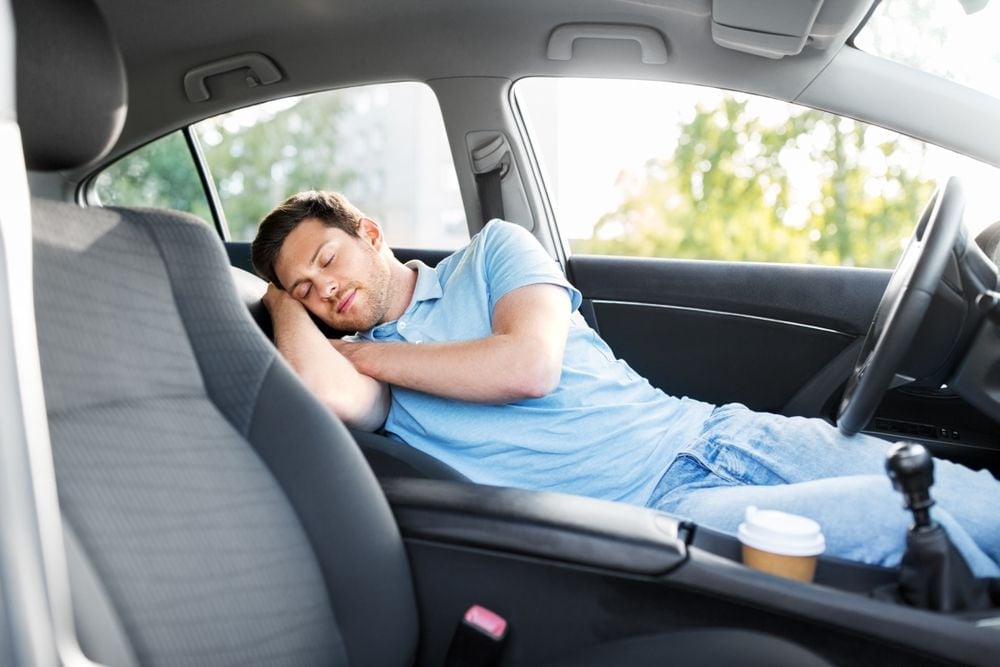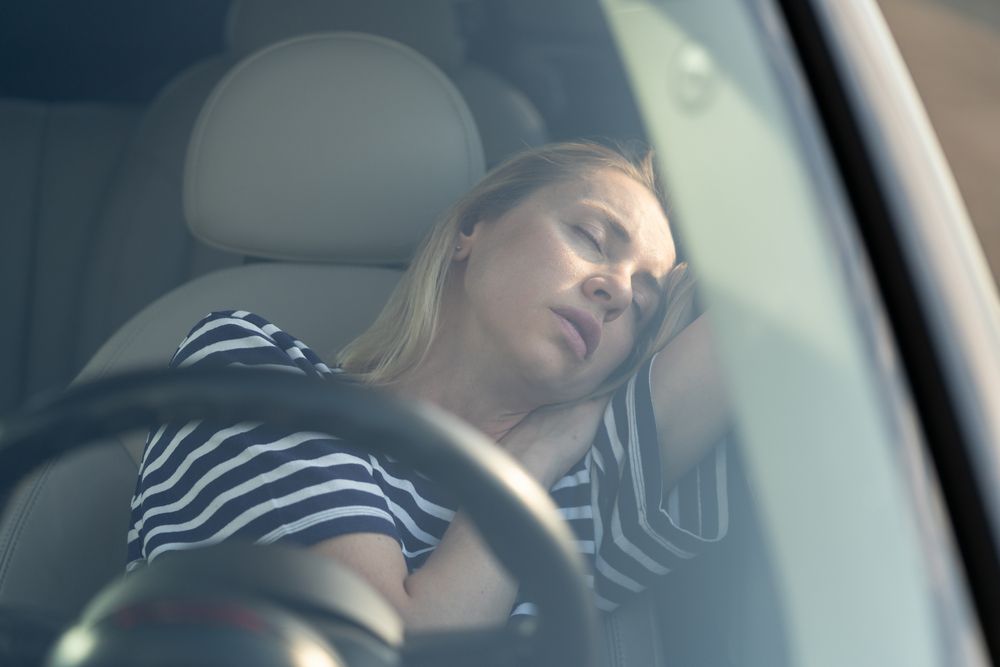
Occasionally you may feel the need to take a nap or even sleep overnight in
your car.
No, you generally won't suffocate in a car with all the windows closed
because cars are not airtight. However, even with all the windows
rolled up, cars let in fresh air through the vents, which brings in
some amount of oxygen, making it possible for you to breathe.
This post addresses how safe the practice of sleeping in cars is. Have a
look!
 You are at virtually no risk of suffucation when sleeping in a car that is not running.
You are at virtually no risk of suffucation when sleeping in a car that is not running.
Can You Suffocate In A Car With Closed Windows?
Suffocating in a car with the windows rolled up is very unlikely. This
is because when the car windows are closed, its ventilation system
continues to circulate air within the interior cabin.
There are rubber seals around the doors and windows of a car that prevent
conventional weather elements, such as rain, from getting inside. However,
even if this sealing keeps fresh air out, some can still seep inside
through the air ducts around the cabin.
You risk suffocating when you have too many people inside the car or
parked in an enclosed place with the engine idling.
How Long Can You Breathe In A Car With The Windows Closed?
According to a
study
conducted by Harvard University, the air inside a car with closed
windows changes one to three times per hour. So, there is very little
chance of you running out of oxygen.
As said above, cars are not airtight. However, an average midsize car holds
about 3,000 to 4,000 liters of air, so there is plenty of oxygen for a
single person or a couple.
Vehicles are also equipped with a ventilation system with air ducts going
in and out of the passenger cabin. Even if the windows are rolled up, these
air ducts help promote air circulation so you won't be deprived of oxygen
and can breathe for as long as you want.
Can You Suffocate If You Sleep In Your Car With The Windows Up?
Under normal circumstances, there is very little chance of suffocation
if you sleep in a car with windows up. However, the risk increases when
you are parked in an enclosed space with the engine idling or when you
have too many people sleeping in the same vehicle.
Let's see how these are risk factors:
Sleeping In A Sealed Car With Too Many People
You are sleeping in a car with windows closed, and the air vents bring
fresh air from outside. There is no risk of suffocation in these
circumstances.
But if you are sleeping with more people inside the car, they will also
inhale some amount of air present in the cabin.
The same Harvard study found out that if about nine people sleep inside the
same car with windows closed, the oxygen inside the cabin can theoretically
be depleted before it is sufficiently replaced.
Sleeping In A Sealed Car With Engine Idling
You can suffocate while sleeping in a car with windows closed if it is
parked in an enclosed space and the engine is left running.
This is because a car exhaust emits toxic fumes, such as carbon monoxide,
that can be dangerous if inhaled in substantial quantities. If you have
chosen an enclosed space, like a garage, as your sleeping spot, the fumes
can build up and find their way inside the cabin where you are sleeping.
This can also happen when you are parked in an open space but close to
other vehicles with engines idling. The fumes from their tailpipes may make
their way inside your car, risking carbon monoxide poisoning.
Can You Run Out Of Oxygen Sleeping In A Car?
No, under normal circumstances, you cannot run out of oxygen while
sleeping in a car.
The air we breathe in contains 21% oxygen. So when an average adult inhales
the air, it consumes about 5 to 6% of its oxygen and exhales the rest of
the 15%.
This means even if you are breathing in the same air, you can safely inhale
it two to three times more. So if you are alone, your car has enough oxygen
to keep you breathing for several hours as you sleep.
Not to forget the 1 to 3 air changes per hour that will bring fresh oxygen
from the outside.
 You are at risk of carbon monoxide poisoning when sleeping in a running car.
You are at risk of carbon monoxide poisoning when sleeping in a running car.
Can You Get Carbon Monoxide Poisoning Sleeping In A Car?
It is possible to get carbon monoxide poisoning while sleeping in a
car.
Carbon monoxide poisoning is a much more serious concern about sleeping in
a sealed car than suffocation. Several factors may lead to carbon monoxide
poisoning when sleeping in a car.
Engine Idling While Parked In An Enclosed Location
Sleeping with your engine on can create a life-threatening situation if you
have chosen an enclosed space as your sleeping spot.
Your car's exhaust system emits carbon monoxide as a part of its exhaust
gases. When you are parked in a place with minimal air movement, the car's
intake ducts pull these fumes in along with the air.
Since carbon monoxide is colorless and odorless, it might go undetected and
slowly accumulate in the cabin, eventually leading to poisoning.
Parking Close to Other Running Vehicles
Even if your car is not running, it can pull in the toxic carbon monoxide
emitted by the surrounding vehicles.
With the windows closed, the carbon monoxide concentration in the cabin air
might slowly rise and become fatal.
Faulty Exhaust System
If your car has a faulty exhaust system, it may leak toxic exhaust gases
into your passenger cabin.
This can also lead to carbon monoxide poisoning if your windows are rolled
up and there is insufficient airflow to disperse the fumes.
How To Stay Safe While Sleeping In A Car?
Here are some tips to help you stay safe while sleeping in your car:
Find A Safe Parking Spot
Make sure you are parking in a place away from moving cars.
Choose a well-lit area with a level ground for maximum visibility and
stability.
You can choose from the many designated rest areas (DRAs) along highways.
Sleeping with your car parked in one offers security because DRAs are
usually littered with other people sleeping in their vehicles.
Lock and Seal Your Vehicle
Besides suffocation and exhaust emissions, falling asleep in a vehicle
makes you vulnerable to criminal elements.
Lock all the doors and roll up the windows to restrict intruder access. If
you decide to crack a window for optimum circulation, ensure the gap is
small enough to restrict outside access to the cabin.
For added safety, try to park with the driver-side door against a solid
object, such as a wall or a tree.
If you have a hike or other outdoor equipment attached to your car, try to
place it inside, as it can be tempting for thieves, making your vehicle a
hotspot.
Don't Leave The Engine Running
The easiest way to prevent carbon monoxide buildup is to turn the engine
off before sleep.
If you want to change the temperature inside the car, keep the engine
running until the interior is cold or warm enough to your liking, then turn
it off. Don't sleep with the engine running.
Avoid Parking Near Other Running Cars
Another important safety precaution to avoid carbon monoxide poisoning is
to stay away from other running vehicles. In addition, it's best to park in
an open space to promote good air circulation.
Keep The Tailpipe Unblocked
A blocked tailpipe can suddenly cause carbon monoxide to pour into the
vehicle cabin. So make sure that no snow, sand, mud, or any other slush is
blocking it.
Check For Exhaust Leaks
Checking for exhaust leaks is an important part of car maintenance. If you
lag in this regard, make sure to have a professional look at it before
setting out on a road trip.
Tell Someone About Your Location
It is also important to let someone know where you are and what you will
do. Give them the address or a geotag so they can rest easy knowing that
you are safe.
Conclusion
Cars are not airtight. You cannot suffocate in one if the windows are
closed.
There is some risk if too many people are inside the same vehicles or if
the car is parked in an area with limited air circulation.
Sleeping in a car may not be very pleasant, but it is not as dangerous as
many assume. Make sure you take the necessary precautions, like parking in
an open space and turning the engine off, and you'll be safe.